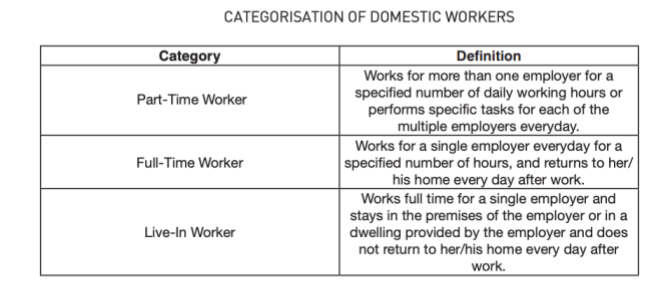Context:
A Gurgaon-based couple was recently booked for assaulting a minor domestic worker. This incident raises questions about the unequal power dynamics between employers and employees in India’s informal employment sector.
More On New:
- There no uniform policy or legislation has been formulated regarding the domestic workers.
- As majority of such workers are migrants, there is a need for greater coordination between the Union and State Governments to address the challenges faced by the domestic workers.
What is domestic work ?
According to the International Labour Organisation (ILO ) Domestic Workers Convention, 2011, Article 1:
(a) The term ‘domestic work’ means work performed in or for a household or households;
(b) The term ‘domestic worker’ means any person engaged in domestic work within an employment relationship;
(c) A person who performs domestic work only occasionally or sporadically and not on an occupational basis is not a domestic worker.

Source: SPRF
Current Status:
- It is estimated that there are 4.8 million domestic workers including 2.9 million female domestic workers. Domestic work accounts for 3.5% of women’s total employment.
- Domestic workers form the third-largest category of workers after agriculture and construction.
- The majority of domestic workers in India are illiterate/ minimally educated and low-skilled. ~200,000 children are employed as domestic help and in dhabas.
Challenges faced by Domestic Workers in India?
- Poor Working Conditions: Domestic workers are denied minimum wages. They lack any social security cover. Many workers are exploited to work for long hours.
- Lack of Laws to Protect Rights: The domestic workers in India are not covered by any Act. The National Commission for Women had drafted the Domestic Workers (Registration, Social Security and Welfare) Bill in 2008-10. However, the Bill wasn’t passed.
- Issues in Implementation: Domestic work was added to the list of scheduled employment under the Minimum Wages Act, 1948, which coincided with the 2011 ILO convention 189. However, the implementation remains poor, with most domestic workers working below minimum wage level. Only 13 States/UTs have passed legislation requiring minimum wages for domestic employees.
- Insufficient Data: There is lack of reliable data regarding number of domestic workers. There is large variation among estimates, with number of workers varying from 4 million to 50 million.
- Informal Placement Agencies/Housekeeping Companies: The companies that provide domestic workers in urban areas themselves function in an informal manner. They are more focused on their own profits and care little about the rights of the workers. Lack of scrutiny of their functioning contributes to the exploitation of the workers.
- Neglect of Domestic Labour Rights: Legislation pertaining to workers such as the Industry Disputes Act, 1947, the Employee’s Provident Fund Act, 1952, and the Factories Act, 1948, do not recognise the labour performed by domestic workers in private households as ‘work’.
- Poor Unionisation: Only a small fraction of domestic workers are unionised or are part of organised groups. Lack of unionisation reduces their bargaining power to demand better wages.
What steps have been taken for the welfare of Domestic Workers?
- The Rashtriya Swasthya Bima Yojana (RSBY) was extended to cover domestic workers. They are now covered under the Pradhan Mantri Jan Arogya Yojana.
- The e-Shram portal aims to register 38 crore unorganised workers in the country.
- A Voluntary Employers’ Pledge to Promote Decent Work for Domestic Workers in India was launched and adopted by All India Organizations of Employers and Employers Federation of India.
- The Union Minister for Labour and Employment has flagged off the first ever All India Survey on Domestic Workers (DW).
What more steps should be taken going ahead?
- First, there is a need for greater social and political commitment to address the challenges faced by domestic workers. In the absence of such commitment, the abuse will continue.
- Second, Due to differences among categories of domestic workers (like part-time, live-in etc.), the methods of determining minimum wages are complex (employing either ‘a need-based formula’ or a living wage, based on time and piece rate). There is a need to standardise the type and amount of work performed.
- Third, The data regarding migrant workers must be improved. This will help in better assessment regarding the status of domestic workers.
- Fourth, Since most domestic workers in India are migrants, there is need for better cooperation among States to address the issues. The Union Government can step-in to ensure better coordination. A draft Model Act can be enacted by the Parliament which can be adapted by States according to their local conditions.
- Fifth, A report by the Commonwealth Human Rights Initiative (CHRI) recommends that the Government should formulate a binding National Policy on Domestic Workers, instead of providing general guidelines.
- Sixth, The Government has developed an Integrated National Plan of Action against Trafficking. The Government is also taking steps to put some remedial measures in place in the form of Integrated Anti-Trafficking Units and Anti-Trafficking nodal cells. However, there is a need for a more comprehensive legislation on labour trafficking.
News Source: The Indian Express
![]() 20 Feb 2023
20 Feb 2023
